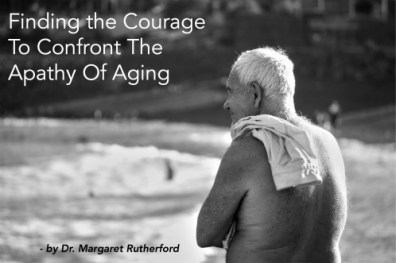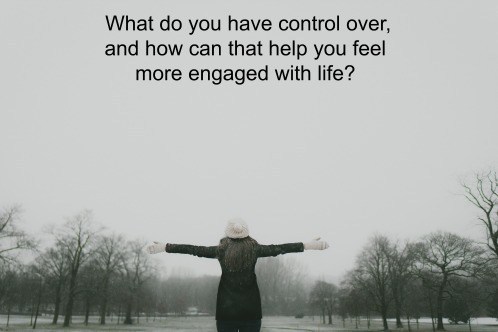Many articles that focus on living well in midlife preach the importance of keeping the "oomph" in your step.
They feature people who have changed careers from stock broker to sculptor at 50, walked the Appalachian trail at 60, or learned how to skydive at 70. (Not exactly middle age anymore, but you get the drift.)
I'm all for that. These stories are often inspiring. Intriguing even. The message is clear. "Don't allow your age to limit your potential." We baby boomers have not been rule-bound by much, so it seems natural that we would be challenging the stereotype of "older people."
But what about the energy involved in maintaining your joy in life, when you're experiencing natural losses from growing older?
What about the courage to confront apathy, and to keep caring about what is going on around you?
I hear people making unhealthy adjustments all the time.
"Now that we're older, we don't do as much with friends -- I haven't seen my brother in Seattle for a couple of years now."
"With the children gone, it doesn't seem worth the effort."
"I used to love going and doing, but it takes so much more out of me since my surgery."
I get it. I hit 60, and my body started talking to me. And not in language that I particularly enjoy. I recognize that chronic pain or illness can eat away at your resolve, or even your enjoyment of life.
The operative word is "can."
I worked with a woman named Gretchen years ago, who had traveled the world as an international expert in her field. She was married, very happily, but had had no children. Within a two-year time span, her body had become riddled with arthritic pain, so badly that she had to retire from giving speeches in Belgium, or acting as a consultant in Chile. She had to rest, every day, for long periods of time. She might be able to garden a little, or read.
She became very depressed, and came to me.
We worked on an active grieving process, something she hadn't allowed herself to do because that would be "feeling sorry for herself." Yet we couldn't do much about her physical pain, other than relaxation techniques and strategies to decrease her worry.
In the end, Gretchen might have helped me understand things, much more than I helped her.
She came in one day, and sat very quietly in a chair.
"I have decided what I need to do. I may not be able to teach others anymore. I may not travel or be able to do what I have loved for years. But I am still married to a wonderful man. I can be there for him. I can do my best to be interested in him. I can try to put a smile on my face when I hear the key in the door, and rather than focusing on the little I have accomplished that day, focus on what I have accomplished, given my condition."
And she smiled.
She had discovered what she had control over, and that gave her a sense of empowerment. Her spirit didn't have to be governed by her illness. She could continue caring, and not become apathetic.
"What do you have control over, and how can that help you feel more engaged with life?"
Not many of us will walk the Appalachian Trail. I can promise you, I will never skydive, unless I fall out of a plane.
But we, in middle to older age, can focus on what is within our power to achieve, whether that be caring, guiding, laughing, creating, learning, or staying connected.
Here are things to remember.
1) You are worth making your life as enjoyable and meaningful as possible.
Whether or not your kids are home, or visit very often, you have value. If you never fix an apple pie because the kids aren't home to eat it, but you love it? Fix a pie. Take a couple of pieces to a neighbor.
2) How you spend your time is important.
If you love to go fishing, but the guy you always went with you is too shaky on his feet to go, then ask around at the tackle store for others who might be interested. Or ask one of your grandchildren to go. Or just go. Go tell fish tales to your friend. He'll appreciate it.
3) Keep a sense of humor.
Negativity is catching.
4) Feeding your relationships is vital.
If you can't get to Seattle to see your brother, learn how to use FaceTime and give him a call. If your best friend moved across town, meet in the middle for a cup of java or a glass of wine. Establish a new tradition with her. Roll with the change, instead of focusing on what used to be.
5) Search for what you have control over.
I can't say this enough. Like Gretchen, it may seem that you're a victim of some cruel joke. To choose to look for what can feed your spirit, and allow you to feel a part of your family, your church, your community, takes courage.
Apathy is a killer of joy. If I don't care anymore, if I decide things are too much trouble to try or do, then life will pass me by.
It's one thing to choose solitude.
It's another, to give up.
You can read more of Dr. Margaret on her website. Click here.
Earlier on Huff/Post50:



